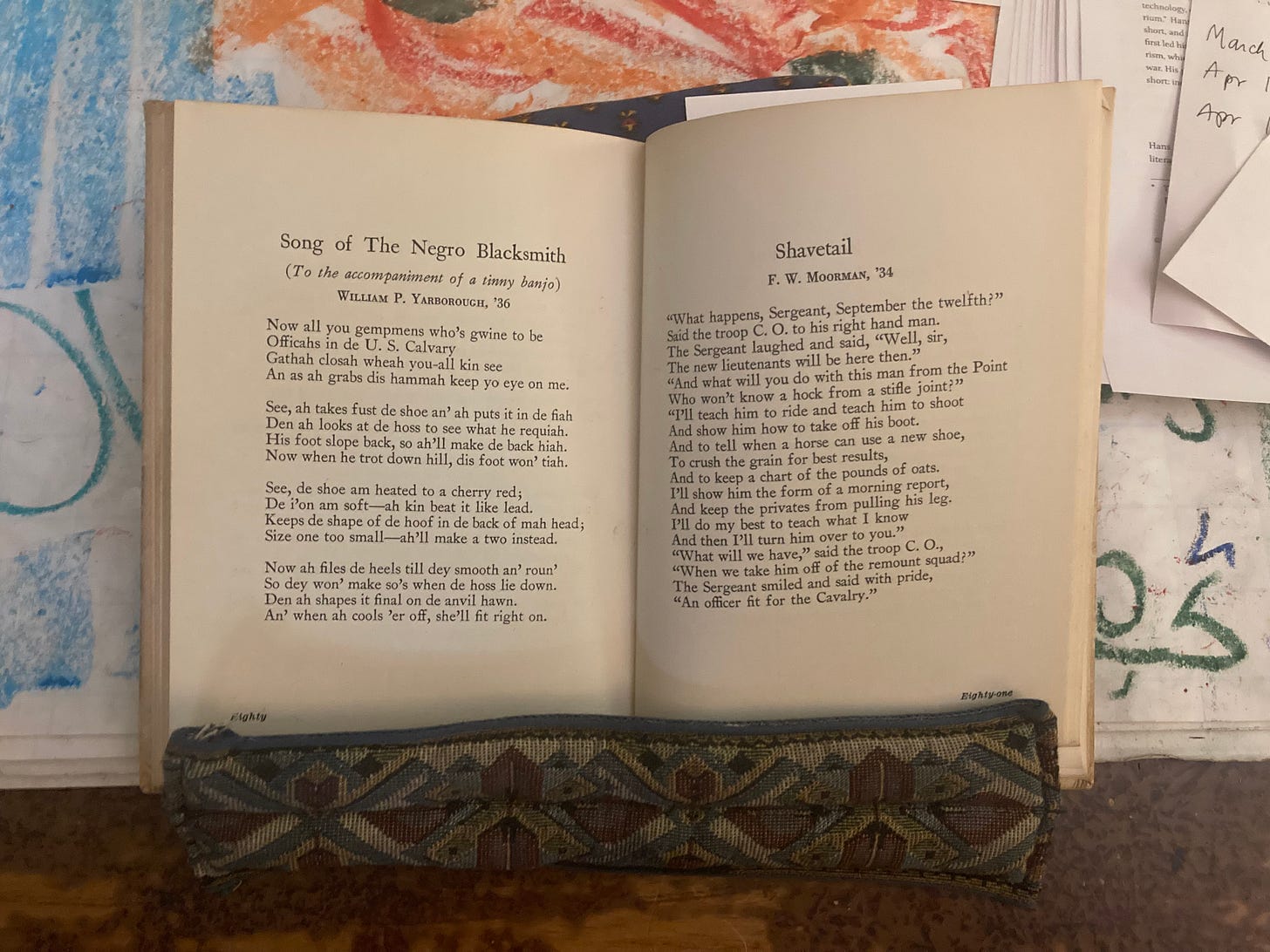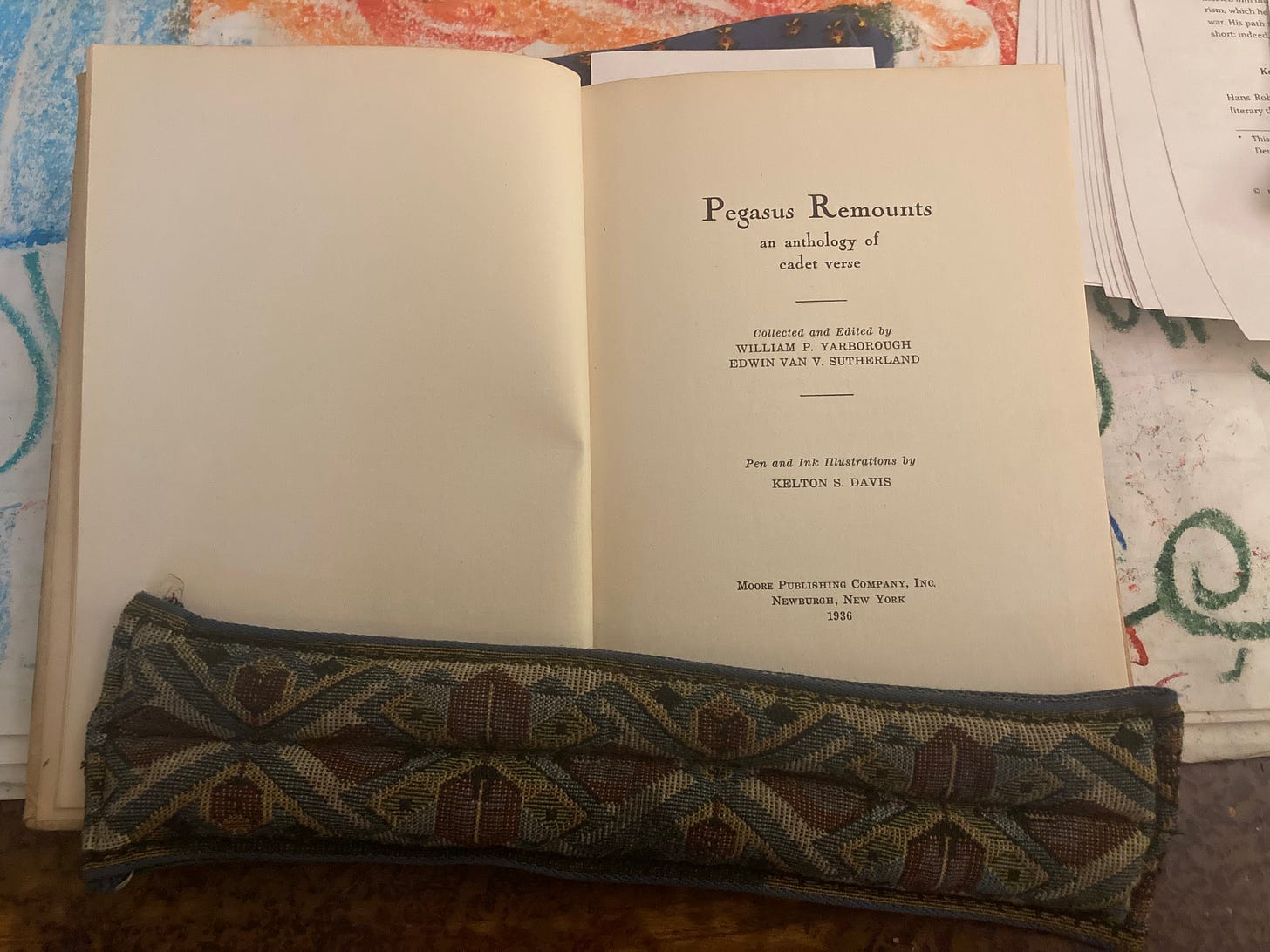Song of the Negro Blacksmith (i) and Shavetail (i)
from cadets William P. Yarborough and F.W. Moorman of the United States Military Academy
At the left, verso, in dictionary spelling that you may copy into a translator:
Now all you gentlemens who is going to be officers in the U.S. Cavalry gather closer where you all can see and as I grabs this hammer keep your eye on me.
See, I takes first the shoe and I puts it in the fire then I looks at the horse to see what he require. His foot slopes back, so I’ll make the back higher. Now when he trot down hill, this foot won’t tire.
See, the shoe am heated to a cherry red; the iron am soft - I can beat it like lead. Keeps the shape of the hoof in the back of my head; size one too small - I’ll make a two instead.
Now I files the heels till they smooth and round so they won’t make sores when the horse lie down. Then I shapes it final on the anvil horn. And when I cools her off, she’ll fit right on.
It’s a scene of instruction. The farrier instructs the gentlemen. He uses his trade to teach them how to be officers of the Army of the United States of America.
He works for a living, fitting iron to hoof right there in front of them. He tells them how to watch, what officers and gentlemen do.
The poet is a cadet, such a gentleman, who has not only written this poem but collected poems from his class and other cadets they have known on campus. It is 1936, at the academy whose graduates
served the Confederate States of America and the USA. Around 1936 at my college in my native city we erected our memorial to the war of classmates 1860-4. We listed each brother and cousin and father and son from our school for civilian officers, in order as they fell.
When the poet was born the survivors were hale and hearty men in the prime of life who tented at night on the old campgrounds, singing the old battle songs. They gathered for the last times on this earth around the year of this book and poem’s publication.
Why did William P. Yarborough call his poem the Song of the Negro Blacksmith? It isn’t a song. What is the mock specification (To the accompaniment of a tinny banjo)? Something to do with the minstrel stage?
For sure. I am not sure what exactly. The blacksmith is not a comic in blackface. The poem from F.W. Moorman on the facing page, recto, explains the same situation in plain English, which by the way nobody speaks, well some do and boy is that a dialect.
F.W. is 2 years ahead of William P. Where young Bill the upperclassman shows a man talking to cadets, his senior Frank the subaltern speaks of the Shavetail, newly commissioned. Before the arrival of the shavetails their troop C.O. queries the Sergeant, who replies, in terms as specific as the blacksmith’s, about turning them into officers fit for the Cavalry.
These are poems of transformation. The poet William P. Yarborough watched enlisted men so well he retired as a lieutenant general, who may stand in with his 3 stars for a 4-star general of the Army who may run the whole thing.
On the way the cadet became the brigadier general (1 star) who brought the United States Special Forces to the attention of John Fitzgerald Kennedy, Jr., the president who declined the advice of his general officers (4 stars each) to end life on earth over Cuba. We may credit Yarborough with all these writers I have brought to your attention who have worn a green beret.
F.W. Moorman retired as major general (2 stars. 1 less than a lieutenant. Nothing to do with other lieutenants and majors. General means a general officer, one who may step in anywhere. Major means in Latin bigger, in this case than a brigadier.)
I have not yet learned who Frank watched doing what for work. Those 2 discreet initials for a byline suggest to me that I am not going to learn. F.W. retired with a commendation for exceptional service specified only as “1955-1965.”
Those are the years of the United States Military Assistance Advisory Group Viet Nam, whose every commander was a lieutenant general. There was a MAAG in Thailand too, still there.
Viet Nam letters respects the property of others under paragraph 107 of United States Code Title 17. If we asked for permission it wouldn’t be criticism. We explain our fair use at length in the letter of September 12, 2022.








Dear Dan your presentation of these moments and these writers is poetry that I don't believe there is any other source for on Gods Green Earth. Thank you for your life, your mind, and your grasp.